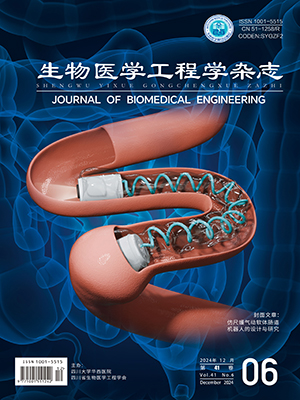| 1. |
Farwell L A, Donchin E. Talking off the top of your head: toward a mental prosthesis utilizing event-related brain potentials. Electroencephalogr Clin Neurophysiol, 1988, 70(6): 510-523.
|
| 2. |
Kennedy P R, Bakay R A, Moore M M, et al. Direct control of a computer from the human central nervous system. IEEE Trans Rehabil Eng, 2000, 8(2): 198-202.
|
| 3. |
Hochberg L R, Serruya M D, Friehs G M, et al. Neuronal ensemble control of prosthetic devices by a human with tetraplegia. Nature, 2006, 442(7099): 164-171.
|
| 4. |
Flesher S N, Downey J E, Weiss J M, et al. A brain-computer interface that evokes tactile sensations improves robotic arm control. Science, 2021, 372(6544): 831-836.
|
| 5. |
Aflalo T, Kellis S, Klaes C, et al. Neurophysiology. Decoding motor imagery from the posterior parietal cortex of a tetraplegic human. Science, 2015, 348(6237): 906-910.
|
| 6. |
Katzschmann R K, DelPreto J, MacCurdy R, et al. Exploration of underwater life with an acoustically controlled soft robotic fish. Sci Robot, 2018, 3(16): eaar3449.
|
| 7. |
Brunner C, Birbaumer N, Blankertz B, et al. BNCI Horizon 2020: towards a roadmap for the BCI community. Brain-Comput Interfa, 2015, 2(1): 1-10.
|
| 8. |
Xie S X, Yu Z C, Lv Z H. Multi-disease prediction based on deep learning: A survey. Comput Model Eng Sci, 2021, 128(2): 489-522.
|
| 9. |
Zhang C, Kim Y K, Eskandarian A. EEG-inception: an accurate and robust end-to-end neural network for EEG-based motor imagery classification. J Neural Eng, 2021, 18(4). DOI: 10.1088/1741-2552/abed81.
|
| 10. |
Lv Z, Qiao L, Wang Q, et al. Advanced machine-learning methods for brain-computer interfacing. IEEE/ACM Trans Comput Biol Bioinform, 2021, 18(5): 1688-1698.
|
| 11. |
Sadiq M T, Yu X, Yuan Z. Exploiting dimensionality reduction and neural network techniques for the development of expert brain–computer interfaces. Expert Syst Appl, 2021, 164: 114031.
|
| 12. |
He H, Wu D. Transfer learning for brain–computer interfaces: a euclidean space data alignment approach. IEEE Trans Biomed Eng, 2020, 67(2): 399-410.
|
| 13. |
Ajiboye A B, Willett F R, Young D R, et al. Restoration of reaching and grasping movements through brain-controlled muscle stimulation in a person with tetraplegia: a proof-of-concept demonstration. Lancet, 2017, 389(10081): 1821-1830.
|
| 14. |
Pandarinath C, Nuyujukian P, Blabe C H, et al. High performance communication by people with paralysis using an intracortical brain-computer interface. Elife, 2017, 6: e18554.
|
| 15. |
Lin P J, Zhai X, Li W, et al. A transferable deep learning prognosis model for predicting stroke patients’ recovery in different rehabilitation trainings. IEEE J Biomed Health Inform, 2022, 26(12): 6003-6011.
|
| 16. |
Wang D X, Ng N, Seger S E, et al. Machine learning classifiers for electrode selection in the design of closed-loop neuromodulation devices for episodic memory improvement. Cereb Cortex, 2023: bhad105.
|
| 17. |
Lim C G, Soh C P, Lim S S Y, et al. Home-based brain-computer interface attention training program for attention deficit hyperactivity disorder: a feasibility trial. Child Adolesc Psychiatry Ment Health, 2023, 17(1): 15.
|
| 18. |
Swann N C, Hemptinne C D, Miocinovic S, et al. Chronic multisite brain recordings from a totally implantable bidirectional neural interface: experience in 5 patients with Parkinson’s disease. J Neurosurg, 2018, 128(2): 605-616.
|
| 19. |
Yeo P S, Nguyen T N, Ng M P E, et al. Evaluation of the implementation and effectiveness of community-based brain-computer interface cognitive group training in healthy community-dwelling older adults: randomized controlled implementation trial. JMIR Form Res, 2021, 5(4): e25462.
|
| 20. |
Biasiucci A, Leeb R, Iturrate I, et al. Brain-actuated functional electrical stimulation elicits lasting arm motor recovery after stroke. Nat Commun, 2018, 9(1): 2421.
|
| 21. |
Ganzer P D, Colachis S C 4th, Schwemmer M A, et al. Restoring the sense of touch using a sensorimotor demultiplexing neural interface. Cell, 2020, 181(4): 763-773.
|
| 22. |
Benabid A L, Costecalde T, Eliseyev A, et al. An exoskeleton controlled by an epidural wireless brain-machine interface in a tetraplegic patient: a proof-of-concept demonstration. Lancet Neurol, 2019, 18(12): 1112-1122.
|
| 23. |
吴雅兰, 柯溢能, 卢绍庆. 浙江大学完成国内首例植入式脑机接口临床转化研究. (2020-01-17)[2023-02-20]. http: //www.news.zju.edu.cn/2020/0117/c24345a1957263/page.htm.
|
| 24. |
Willett F R, Avansino D T, Hochberg L R, et al. High-performance brain-to-text communication via handwriting. Nature, 2021, 593(7858): 249-254.
|
| 25. |
Beauchamp M S, Oswalt D, Sun P, et al. Dynamic stimulation of visual cortex produces form vision in sighted and blind humans. Cell, 2020, 181(4): 774-783.e5.
|
| 26. |
FDA. Regulatory overview for neurological devices. (2021-05-20)[2023-02-20]. https: //www.fda.gov/medical-devices/neurological-devices/regulatory-overview-neurological-devices.
|
| 27. |
FDA. Regulatory Science for Neurological Devices. (2021-05-20)[2023-02-20]. https: //www.fda.gov/medical-devices/neurological-devices/regulatory-science-neurological-devices.
|
| 28. |
Valeriani D, Cecotti H, Thelen A, et al. Editorial: Translational brain-computer interfaces: From research labs to the market and back. Front Hum Neurosci, 2023, 17: 1152466.
|
| 29. |
Gao X, Wang Y, Chen X, et al. Interface, interaction, and intelligence in generalized brain–computer interfaces. Trends Cogn Sci, 2021, 25(8): 671-684.
|
| 30. |
Mitchell P, Lee S C M, Yoo P E, et al. Assessment of safety of a fully implanted endovascular brain-computer interface for severe paralysis in 4 patients: the stentrode with thought-controlled digital switch (switch) study. JAMA Neurol, 2023, 80(3): 270-278.
|
| 31. |
Rubin D B, Ajiboye A B, Barefoot L, et al. Interim safety profile from the feasibility study of the braingate neural interface system. Neurology, 2023, 100(11): e1177-e1192.
|




